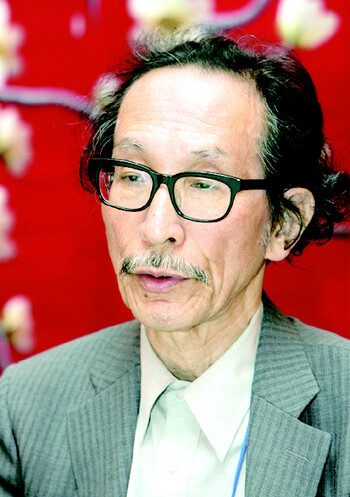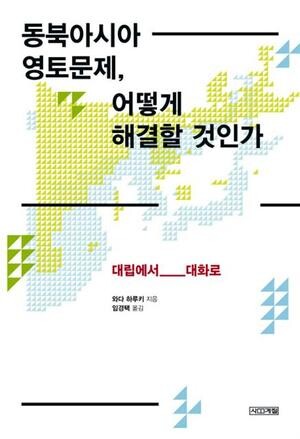hankyoreh
Links to other country sites 다른 나라 사이트 링크
Japanese professor proposes a way forward on Dokdo issue

By Han Seung-dong, senior staff writer
Tokyo University emeritus professor Haruki Wada proposes a very realistic solution on Northeast Asian territorial concerns such as the dispute over the Dokdo islets (called Takeshima in Japan).
“The crux of [South Korea’s] argument is that Japan’s possession of Takeshima in January 1905 was a precursor of its forcible annexation of Korea five years later,” he said. “It is impossible for Japan to refute this claim. And its control over Dokdo, which is based on this claim, will not go away so long as there is a Korean nation or a Republic of Korea.”
Wada’s argument is that Japan can either give up or take the islets by force and risk a war, but it cannot leave the situation unresolved. It is not an easy choice to make. To date, the issue, which started because the US left the matter of the islets’ status unclear in the Treaty of San Francisco in 1951, has essentially been resolved through irresolution, with a “secret agreement” formed during the negotiations to normalize relations between Seoul and Tokyo (also the result of US pressure) in which South Korea would assume effective control while both sides continued to claim the territory as their own. This is the essence of the “Dokdo model.” It is a model that was also adopted until recently on the Diaoyu (Senkaku) Islands, the subject of a dispute between China and Japan.

Now Wada is saying that the Dokdo model no longer applies. The end of the Cold War and the arrival of a democratic government in South Korea combined to break the ties binding Seoul and Tokyo, and the secret agreement was undermined when South Korea responded directly in 2005 to outspoken claims of ownership of the islets by Japan’s Shimane prefecture.
The Diaoyu Islands issue began to unfold along the same lines around the same time. Both sides now stand to lose greatly if they do not acknowledge the issue and enter dialogue and negotiations, with a strong likelihood that things will continue to worsen going ahead. If that happens, the isolation of Japan - which is now facing similar issues with three countries in Northeast Asia - could deal it a fatal blow.
Wada’s solution is simple. “There is no other way but for Japan to give up its claims of sovereignty over Dokdo/Takeshima, which is under South Korean control anyway,” he said. “The sooner it decides to do so, the better. It would be stupid to continue with this hopeful argument and risk making things even worse for South Korean-Japanese relations and angering the public in both countries.”
This does not mean simply washing its hands of the matter. According to Wada, it involves Japan acknowledging that Dokdo is South Korean territory, while South Korea guarantees joint usage of the surrounding waters to Shimane fishermen rather than using the islets as a baseline for delineating its own territorial waters. This approach, he said, would benefit both sides. It would also mean acknowledging a dispute - rather than talking about “integral territory” or “effective control” - and beginning dialogue and negotiations on that note. These discussions would have to take place alongside earnest efforts by Japan to reckon with other unresolved historical matters, including the drafting of women as sexual slaves to its military during the colonial era.
Wada‘s book also focuses on the “northern territories” conflict between Japan and Russia. As one of the premier specialists in this field, he offers a clear and comprehensive account. Wada marshals concrete evidence to show that the Japanese government has blatantly lied about the number of islands involved in the dispute. The Soviet Union, who occupied four islets after the Japanese surrender in World War II, agreed to return two of them to Japan in the 1956 USSR-Japan Joint Statement. Now, the Japanese government is claiming that all four were included in the promised return, said Prof. Wada. The US, as part of its Cold War strategy, played a pivotal role in applying pressure on Tokyo to discourage closer ties with Moscow.
The Diaoyu and Okinawa issues differ in some ways, but they are similar in that they stem from distortions that arose in Japan’s handling of the postwar process as a defeated nation under US leadership, Wada says. In his view, the only way out is through dialogue and compromise - finding a way to live together.
Please direct questions or comments to [english@hani.co.kr]

Editorial・opinion
![[Column] Season 2 of special prosecutor probe may be coming to Korea soon [Column] Season 2 of special prosecutor probe may be coming to Korea soon](https://flexible.img.hani.co.kr/flexible/normal/500/300/imgdb/original/2024/0426/3317141030699447.jpg) [Column] Season 2 of special prosecutor probe may be coming to Korea soon
[Column] Season 2 of special prosecutor probe may be coming to Korea soon![[Column] Park Geun-hye déjà vu in Yoon Suk-yeol [Column] Park Geun-hye déjà vu in Yoon Suk-yeol](https://flexible.img.hani.co.kr/flexible/normal/500/300/imgdb/original/2024/0424/651713945113788.jpg) [Column] Park Geun-hye déjà vu in Yoon Suk-yeol
[Column] Park Geun-hye déjà vu in Yoon Suk-yeol- [Editorial] New weight of N. Korea’s nuclear threats makes dialogue all the more urgent
- [Guest essay] The real reason Korea’s new right wants to dub Rhee a founding father
- [Column] ‘Choson’: Is it time we start referring to N. Korea in its own terms?
- [Editorial] Japan’s rewriting of history with Korea has gone too far
- [Column] The president’s questionable capacity for dialogue
- [Column] Are chaebol firms just pizza pies for families to divvy up as they please?
- [Column] Has Korea, too, crossed the Rubicon on China?
- [Correspondent’s column] In Japan’s alliance with US, echoes of its past alliances with UK
Most viewed articles
- 1[Column] Season 2 of special prosecutor probe may be coming to Korea soon
- 2‘We must say no’: Seoul defense chief on Korean, USFK involvement in hypothetical Taiwan crisis
- 3Is N. Korea threatening to test nukes in response to possible new US-led sanctions body?
- 4Amnesty notes ‘erosion’ of freedom of expression in Korea in annual human rights report
- 5Division commander ordered troops to enter raging flood waters before Marine died, survivor says
- 6N. Korean delegation’s trip to Iran shows how Pyongyang is leveraging ties with Moscow
- 7[Editorial] Korea’s surprise Q1 growth requires objective assessment, not blind fanfare
- 8Is Japan about to snatch control of Line messenger from Korea’s Naver?
- 9No good, very bad game for Korea puts it out of Olympics for first time since 1988
- 10[Reportage] On US campuses, student risk arrest as they call for divestment from Israel